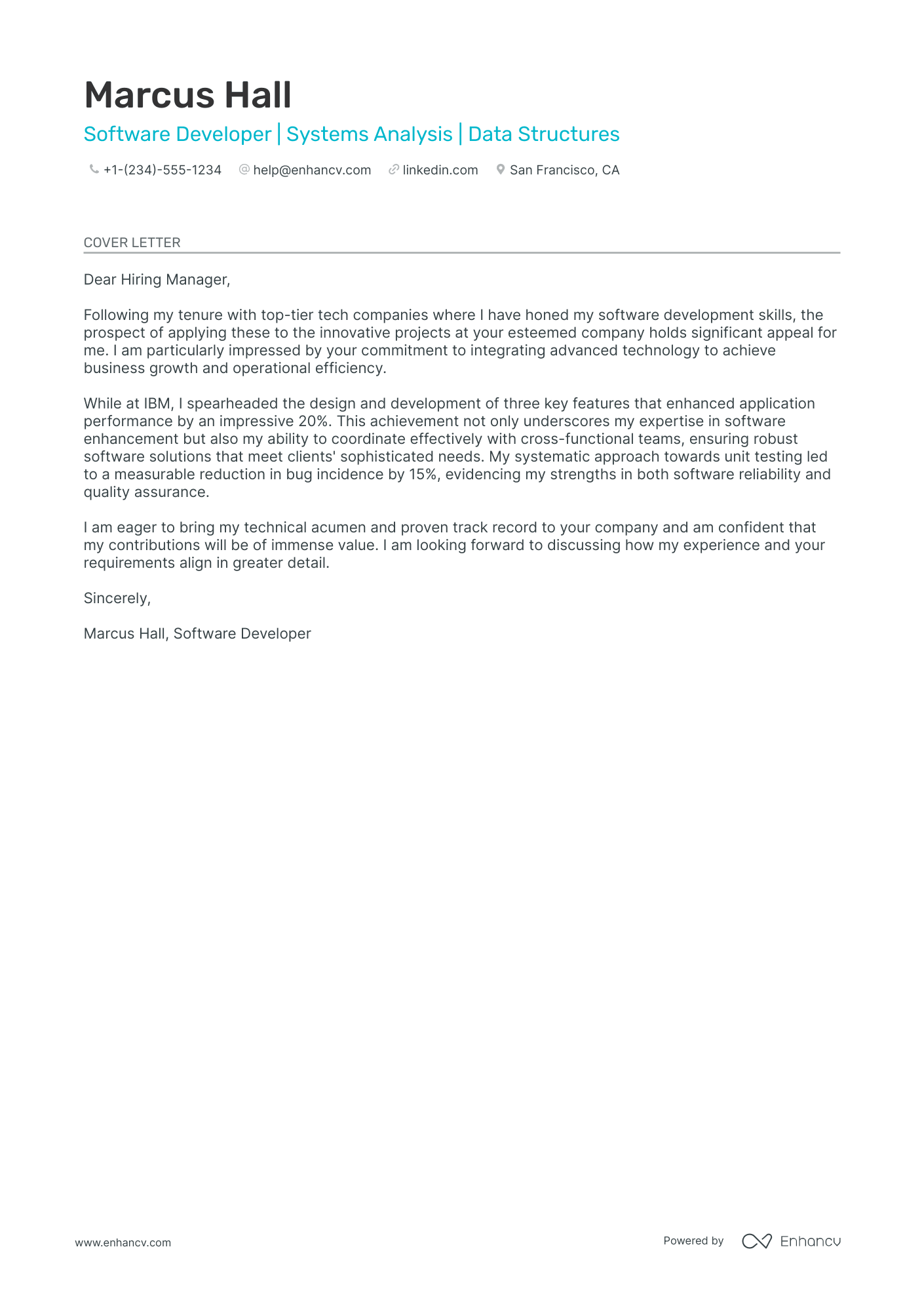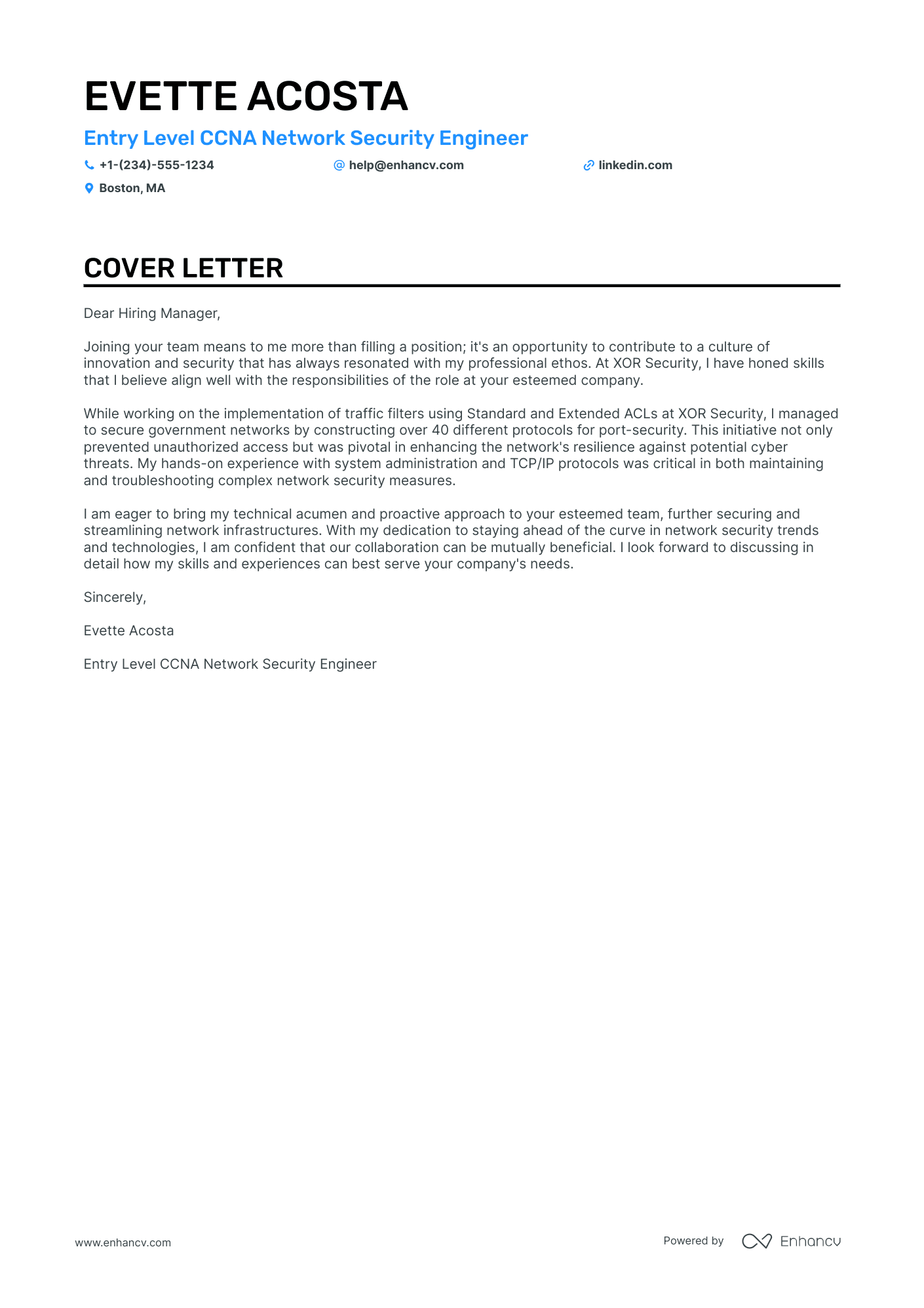Embarking on your job search in the field of computer science, you've meticulously crafted your resume and started firing off applications, only to hit a roadblock: the cover letter. This isn't just a rehash of your achievements; it's a one-page opportunity to weave the narrative of your proudest professional moment. Steer clear of the mundane and craft a letter that's formal without falling into the trap of cliches. Let's unlock the secrets to writing a cover letter that highlights your unique story.
- Some inspiration from other professionals' job-winning cover letters;
- The best structure and format for your computer science cover letter;
- Insights on how to write about your best achievement to stand out;
- A creative twist on your computer science cover letter intro.
Upload your computer science resume to Enhancv's AI, which will quickly scan and prepare a job-winning cover letter for you.
If the computer science isn't exactly the one you're looking for we have a plethora of cover letter examples for jobs like this one:
Drop your resume here or choose a file.
PDF & DOCX only. Max 2MB file size.
Computer science cover letter example
Taylor Foster
New York City, NY
+1-(234)-555-1234
help@enhancv.com
- Highlighting relevant experience - The cover letter mentions a specific project involving 200 hours of exploratory data analysis, showcasing a tangible and lengthy engagement with data. This is a key aspect for a data scientist role where deep dive into data is essential.
- Quantifiable achievements - The applicant quantifies their impact by mentioning the direct outcomes of their efforts, such as fixing over 20 bugs and improving software performance. This demonstrates their effectiveness and result-oriented approach.
- Technical proficiency - Reference to specific tools such as Python, SQL, and Tableau gives a clear picture of the candidate's skill set, aligning with the technical competencies often required for a data scientist position.
- Understanding of business implications - The cover letter connects technical work with its impact on business outcomes, indicating the candidate's ability to translate data insights into business value, a critical trait for a data scientist role.
What are the basics of the design or format of your computer science cover letter?
To start, here's a reminder for you: the Applicant Tracker System (or software that is used to assess candidate profiles), won't be reading your computer science cover letter.
Recruiters enjoy reading computer science cover letters with a standardized format that uses:
- the same font as the resume (e.g. modern ones like Raleway or Volkhov are prefered over the clichéd Times New Roman or Arial);
- single spacing to keep the content concise and organized (this is all ready for you in our cover letter templates);
- a one-inch margin to wrap around the text, like in our cover letter builder;
- PDF as a file format, as it allows your design (and visual element) to stay the same.
Finally, we can't go on without mentioning the key sections of your computer science cover letter.
In the top one-third, make sure to include a header (with your contact information, name, role, and date), a salutation, and an introduction.
Next, follows the heart and soul of your computer science cover letter or its body.
End your computer science cover letter with a closing paragraph and, if you wish, a signature.
Need a cover letter, but short on time? Use our free cover letter generator to create one from your resume in no time.
The top sections on a computer science cover letter
Header: This section includes your contact information, the date, and the employer's contact information, ensuring that your letter appears professional and provides essential details for the recruiter to easily reach out to you.
Opening Greeting: Personalize this section by addressing the hiring manager by name if possible; it demonstrates that you have done your research and are genuinely interested in the position at their specific company.
Introduction: In this part, briefly mention the computer science position you're applying for, how you learned about it, and an overarching statement about why you're an ideal candidate, capturing the recruiter's interest immediately.
Body (Experience and Skills): Detail your relevant computer science experience, specific technical skills, and any significant projects or accomplishments that demonstrate your capabilities and how they align with the job description, convincing the recruiter of your suitability for the role.
Closing (Call to Action): End with a strong closing statement that reiterates your interest in the position, invites further discussion, and thanks the reader for considering your application, leaving a professional and proactive final impression.
Key qualities recruiters search for in a candidate’s cover letter
- Proficiency in relevant programming languages (e.g., Python, Java, C++) - Critical for developing, testing, and maintaining software applications effectively.
- Understanding of algorithms and data structures - Essential for solving complex problems and optimizing application performance.
- Experience with software development methodologies (e.g., Agile, Scrum) - Indicates adaptability and knowledge of efficient, collaborative development processes.
- Familiarity with version control systems (e.g., Git) - Important for collaborating in team environments and managing code changes over time.
- Knowledge of database management and SQL - Enables the design, query, and maintenance of databases, which are integral to many applications.
- Ability to troubleshoot and debug - Key for identifying and resolving issues in software, ensuring reliability and user satisfaction.
Personalizing your computer science cover letter salutation
Always aim to address the recruiter from the get-go of your computer science cover letter.
Use:
- the friendly tone (e.g. "Dear Paul" or "Dear Caroline") - if you've previously chatted up with them on social media and are on a first-name basis;
- the formal tone (e.g. "Dear Ms. Gibbs" or "Dear Ms. Swift") - if you haven't had any previous conversation with them and have discovered the name of the recruiter on LinkedIn or the company website;
- the polite tone (e.g. "Dear Hiring Manager" or "Dear HR Team") - at all costs aim to avoid the "To whom it may concern" or "Dear Sir/Madam", as both greetings are very old-school and vague.
List of salutations you can use
- Dear Hiring Manager,
- Dear [Company Name] Team,
- Dear [Department] Department,
- Dear Mr./Mrs./Ms. [Last Name],
- Dear [First Name] [Last Name],
- Dear [Job Title] Hiring Committee,
Using your computer science cover letter intro to show your dedication
We know just how difficult it is to start writing your computer science cover letter introduction.
There are so many great qualities you have as a professional, which one should you choose?
How about writing up to two sentences about your passion and commitment to the work you do or are set to do?
Try to describe exactly what you enjoy about the potential role.
A positive attitude from the get-go will help you stand out as a motivated computer science professional.
That one achievement in your computer science cover letter body
The lengthiest part of your computer science cover letter is the body.
Within the next three to six middle paragraphs, present yourself as the best candidate for the role.
How can you do that without retelling your whole professional resume?
Select one key achievement that covers job-crucial skills and technologies (and is memorable).
Within the body of your computer science cover letter, aim to tell the story of how you achieved your success. Also, write about how this would help out your potential team.
Final words: writing your computer science cover letter closing paragraph
The final paragraph of your computer science cover letter allows you that one final chance to make a great first impression.
Instead of going straight to the "sincerely yours" ending, you can back up your skills with a promise of:
- how you see yourself growing into the role;
- the unique skills you'd bring to the organization.
Whatever you choose, always be specific (and remember to uphold your promise, once you land the role).
If this option doesn't seem that appealing to you, close off your computer science cover letter with a follow-up request.
You could even provide your availability for interviews so that the recruiters would be able to easily arrange your first meeting.
Which story should you tell in your computer science cover letter when you have zero experience
Candidates, lacking professional experience in the field - this one is for you.
Your computer science cover letter is an exercise of integrity, honesty, and, above all, spinning a positive narrative around your strengths.
And what better way to capture recruiters' attention than with your most job-relevant achievement (this could be from your internship or volunteering experience)?
Make sure to back up your success with transferrable skills that are relevant to the job (e.g. how your year, studying abroad, has taught you to be more motivated and handle multicultural environments).
Another safe card you can bet on is your career dream: in the body of your computer science cover letter, go into the details of how your ambitions would help make the company you're applying for better.
Key takeaways
Writing your computer science cover letter doesn't need to turn into an endless quest, but instead:
- Create an individual computer science cover letter for each role you apply to, based on job criteria (use our builder to transform your resume into a cover letter, which you could edit to match the job);
- Stick with the same font you've used in your resume (e.g. Raleway) and ensure your computer science cover letter is single-spaced and has a one-inch margin all around;
- Introduce your enthusiasm for the role or the company at the beginning of your computer science cover letter to make a good first impression;
- Align what matters most to the company by selecting just one achievement from your experience, that has taught you valuable skills and knowledge for the job;
- End your computer science cover letter like any good story - with a promise for greatness or follow-up for an interview.
Computer Science cover letter examples
By Experience







